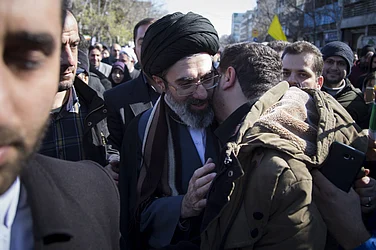The oil producers cartel OPEC+ on Wednesday announced that it would reduce oil production by 2 million barrels per day.
For context, 2 million barrels per day is around 2 per cent of current global oil supply. It would also be the largest cut since the beginning of the Covid-19 pandemic.
Oil prices have already shot up after the announcement and it's expected that prices would rise further. Analysts are saying the crude oil would soon cross $100 per barrel.
The United States has reacted sharply to the oil production cut and has opened its emergency petroleum reserve as a short-term measure. The Indian government has also said that the production cut goes against the assurances made to New Delhi.
The world is concerned about the oil cut as it threatens to push the countries backward which are still recovering from the brunt of the pandemic. High prices would mean reduced demand fears of recession are also being expressed. Here we explain what's OPEC+, what's its reasoning for oil production cut, what are the world's concerns and how are countries reacting.
What's OPEC+, why it's reducing oil production?
Organization of the Petroleum Exporting Countries (OPEC) is a cartel of 13 oil producer countries.
When OPEC is joined by certain non-OPEC members to make collective decisions over world's oil business, it's referred to as OPEC+.
The 13 OPEC members are: Iran, Iraq, Kuwait, Saudi Arabia, and Venezuela, Algeria, Angola, Congo, Equatorial Guinea, Gabon, Libya, Nigeria, and the United Arab Emirates (UAE).
Members that join OPEC to make it OPEC+ are Russia, Mexico, and Kazakhstan.
"OPEC is a cartel that aims to manage the supply of oil in an effort to set the price of oil on the world market, in order to avoid fluctuations that might affect the economies of both producing and purchasing countries," notes Investopedia.
The OPEC has said the cut was "necessary to respond to rising interest rates in the West and a weaker global economy". The idea is that weaker economy would mean low demand, which means if they produce above the demand, it would remain unsold.
It also mentioned "uncertainty that surrounds the global economic and oil market outlooks, and the need to enhance the long-term guidance for the oil market" while announcing the oil production cut.
How OPEC oil cut would affect world?
The rule of demand and supply will kick in, which says that when supply is lesser than demand, prices rise. So prices of fuel will rise.
Prices have already started to rise. Even before the cut was announced, CNBC on Monday reported that oil prices were up by 4 per cent.
CNBC on Thursday reported, "International benchmark Brent crude futures traded at $92.82 a barrel during Wednesday afternoon deals in London, up around 1.1 per cent US West Texas Intermediate futures, meanwhile, stood at $87.37, almost 1 per cent higher."
Analysts say oil prices would cross $100 per barrel.
Analysts at PVM Oil Associates and Goldman Sachs "see Brent reaching triple digits over the next three months, before climbing to $105 over a six-month horizon", reported CNBC.
Such prices come at a time when several countries are already dealing with inflation and high fuel prices, such as the United Kingdom where the cost of living crisis dominated the recently-concluded prime ministerial race. As prices go higher, these countries would suffer more and there would be a serious risk of recession.
"While inflation is still high and recession is staring everyone in the face, this move would exacerbate the economic downturn, as high oil prices serve as a de-facto tax on the economy," noted Forbes.
Experts have also highlighted that OPEC+ reasoning to match supply with alleged low demand is also flawed as high prices would further drive down demand.
How is world reacting?
The world is reacting with anger and disappointment.
US President Joe Biden is "disappointed" with the decision.
The White House is "disappointed by the shortsighted decision by OPEC+ to cut production quotas while the global economy is dealing with the continued negative impact of Putin’s invasion of Ukraine".
Biden authorised, as a short-term measure, the release of 10 million barrels of oil from US strategic petroleum reserves. The release of this oil in the market would increase supply for some time.
Earlier in November 2021, the United States has partnered with India, China, Japan, South Korea, and the United Kingdom to simultaneously release oil from their respective strategic reserves into the market to boost supply and drive down prices.
But this is a short-term measure. It further puts stress on these reserves, which are meant for national emergencies. The US reserv is already at its lowest in four decades.
"The nation's Strategic Petroleum Reserve had 416.4 million barrels in the week ended Sept. 30 – the lowest level since 1984...Biden had tapped the emergency oil stash four times over the past year in hopes of lowering gas prices, including in March, when he ordered a record-setting 180 million barrels of oil released from the reserve – 1 million barrels per day over six months," reported Fox Business.
The Indian government also said that they were assured there would be no cuts. Petroleum Minister Hardeep Singh Puri also said such cuts would have several unintended consequences too.
He said, "I'm told that there were assurances given, don't ask me whom, etc., that in fact they were not planning to do this...So, it becomes a vicious cycle. Whether that has been fully taken into account or not, it's not for me to comment on the decision has been taken. But I believe that all decisions which are taken and which have global ramifications have both intended and unintended consequences. How these play out we will see."
Puri added that the decision comes at a time when many parts of the world are either in recession or are in recession-like conditions.
Geopolitics of oil and oil cuts
Two of the biggest oil producers of the OPEC+ are Saudi Arabia and Russia.
While Saudis are a US ally, Russians are the main rivals. In this decision, both are on board as high oil prices benefit both of them.
Russian oil and gas has been a major financier of the Russian war efforts in Ukraine and, in the disruption in the pandemic, Russia has sold lots of oil at discount to countries like India and China, who have attracted the West's ire because of it.
The oil production cuts hurt US interests in two ways. One, the cuts come at a time when the US-led West is trying hard to wean the world off Russian oil. As prices rise, countries would find it hard to say no to discounted Russian oil. Two, the cut comes after a long lobbying by the Biden administration with the Saudis to boost supplies. Rather than boosting, or even keeping supplies same, the Saudis have now announced a cut. This is an embarrassment for Biden administration.
Vox notes, "President Joe Biden has called the move a 'disappointment'. Perhaps more accurately, it’s an embarrassment for an American leader who has sought to enhance relations with the kingdom after a rough start. On top of that, it’s a sign of the limits of America’s ability to determine the global landscape amid its ongoing proxy war against Russia in Ukraine, in which Saudi Arabia has played both the US and Russia against one another."






















